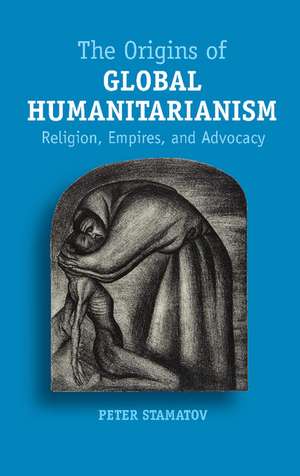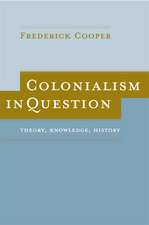The Origins of Global Humanitarianism: Religion, Empires, and Advocacy: Cambridge Studies in Social Theory, Religion and Politics
Autor Peter Stamatoven Limba Engleză Paperback – 8 iul 2015
| Toate formatele și edițiile | Preț | Express |
|---|---|---|
| Paperback (1) | 283.03 lei 6-8 săpt. | |
| Cambridge University Press – 8 iul 2015 | 283.03 lei 6-8 săpt. | |
| Hardback (1) | 691.66 lei 6-8 săpt. | |
| Cambridge University Press – 22 dec 2013 | 691.66 lei 6-8 săpt. |
Din seria Cambridge Studies in Social Theory, Religion and Politics
- 11%
 Preț: 689.78 lei
Preț: 689.78 lei -
 Preț: 203.50 lei
Preț: 203.50 lei -
 Preț: 155.84 lei
Preț: 155.84 lei -
 Preț: 230.33 lei
Preț: 230.33 lei -
 Preț: 176.86 lei
Preț: 176.86 lei -
 Preț: 234.23 lei
Preț: 234.23 lei -
 Preț: 237.74 lei
Preț: 237.74 lei -
 Preț: 160.22 lei
Preț: 160.22 lei -
 Preț: 284.78 lei
Preț: 284.78 lei -
 Preț: 250.30 lei
Preț: 250.30 lei -
 Preț: 327.30 lei
Preț: 327.30 lei -
 Preț: 201.59 lei
Preț: 201.59 lei -
 Preț: 230.51 lei
Preț: 230.51 lei -
 Preț: 286.89 lei
Preț: 286.89 lei -
 Preț: 225.20 lei
Preț: 225.20 lei -
 Preț: 263.79 lei
Preț: 263.79 lei - 14%
 Preț: 686.73 lei
Preț: 686.73 lei -
 Preț: 223.29 lei
Preț: 223.29 lei - 11%
 Preț: 560.27 lei
Preț: 560.27 lei -
 Preț: 286.89 lei
Preț: 286.89 lei -
 Preț: 203.50 lei
Preț: 203.50 lei -
 Preț: 200.61 lei
Preț: 200.61 lei -
 Preț: 231.47 lei
Preț: 231.47 lei -
 Preț: 281.30 lei
Preț: 281.30 lei -
 Preț: 292.67 lei
Preț: 292.67 lei -
 Preț: 275.85 lei
Preț: 275.85 lei - 14%
 Preț: 697.95 lei
Preț: 697.95 lei
Preț: 283.03 lei
Nou
Puncte Express: 425
Preț estimativ în valută:
54.17€ • 56.34$ • 44.72£
54.17€ • 56.34$ • 44.72£
Carte tipărită la comandă
Livrare economică 14-28 aprilie
Preluare comenzi: 021 569.72.76
Specificații
ISBN-13: 9781107521674
ISBN-10: 110752167X
Pagini: 246
Dimensiuni: 152 x 228 x 15 mm
Greutate: 0.34 kg
Editura: Cambridge University Press
Colecția Cambridge University Press
Seria Cambridge Studies in Social Theory, Religion and Politics
Locul publicării:New York, United States
ISBN-10: 110752167X
Pagini: 246
Dimensiuni: 152 x 228 x 15 mm
Greutate: 0.34 kg
Editura: Cambridge University Press
Colecția Cambridge University Press
Seria Cambridge Studies in Social Theory, Religion and Politics
Locul publicării:New York, United States
Cuprins
Introduction; 1. Caribbean beginnings, 1511–20; 2. Pro-indigenist advocacy in the Iberian Atlantic; 3. Religious radicalization and early antislavery; 4. Quaker reformers and the politicization of antislavery; 5. Forging an abolitionist network; 6. The emergence of a new model; Conclusion.
Recenzii
'Peter Stamatov's careful analysis coupled with his theoretical acumen allows him to make an important historical claim: long-distance advocacy was not initially a secular institution, but rather emerged from religious activism among established clergy. However, he does not stop at that point. Stamatov argues that religious activism was highly correlated with the pattern of imperial advance. Thus, empire, religion, and long-distance advocacy develop in relation to each other - but not in any predetermined or uniform way. Rather, it is the interaction between the specific national context and the imperial context that generates the timing and character of the long-distance advocacy. This finding is important on a substantive as well as theoretical level. It will be a path-breaking contribution to the literature on globalization and transnational activism.' Mabel Berezin, Cornell University
'This monumental book unearths a dazzling array of sources to found a new genealogy of global culture. Early-modern Catholic and Protestant churches in Europe sanctioned colonization abroad, but some Spanish and British activists also deployed religion to enlarge the rights of distant colonial subjects. Deciphering the causes of their growing long-distance aid to cultural strangers comprises a puzzle about our times that is every bit as striking as the rise of nationalism or of democratic insurgency. Peter Stamatov has posted a landmark in understanding Western engagement in the world to our day.' Richard Biernacki, University of California, San Diego
'This monumental book unearths a dazzling array of sources to found a new genealogy of global culture. Early-modern Catholic and Protestant churches in Europe sanctioned colonization abroad, but some Spanish and British activists also deployed religion to enlarge the rights of distant colonial subjects. Deciphering the causes of their growing long-distance aid to cultural strangers comprises a puzzle about our times that is every bit as striking as the rise of nationalism or of democratic insurgency. Peter Stamatov has posted a landmark in understanding Western engagement in the world to our day.' Richard Biernacki, University of California, San Diego
Notă biografică
Descriere
This book locates the historical origins of modern global humanitarianism in the recurrent conflict over the ethical treatment of non-Europeans.












